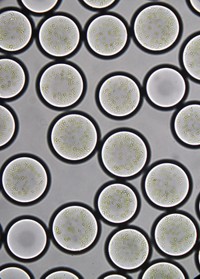Advertisement
Grab your lab coat. Let's get started
Welcome!
Welcome!
Create an account below to get 6 C&EN articles per month, receive newsletters and more - all free.
It seems this is your first time logging in online. Please enter the following information to continue.
As an ACS member you automatically get access to this site. All we need is few more details to create your reading experience.
Not you? Sign in with a different account.
Not you? Sign in with a different account.
ERROR 1
ERROR 1
ERROR 2
ERROR 2
ERROR 2
ERROR 2
ERROR 2
Password and Confirm password must match.
If you have an ACS member number, please enter it here so we can link this account to your membership. (optional)
ERROR 2
ACS values your privacy. By submitting your information, you are gaining access to C&EN and subscribing to our weekly newsletter. We use the information you provide to make your reading experience better, and we will never sell your data to third party members.
Biofuels
Sweet signal could be used to increase plant oil production for biofuels
A small molecule helps stabilize the protein that turns on plant oil production
by Cici Zhang
September 29, 2018
| A version of this story appeared in
Volume 96, Issue 39
When plants’ sugar levels are low, they reduce their investment in energy-intensive fatty acid synthesis. But in biofuel production, people might want to coax plants into making more fatty acid or oil. Now, researchers from Brookhaven National Laboratory (BNL) and Max Planck Institute of Molecular Plant Physiology report a molecule that regulates plants’ oil synthesis “on” switch (Plant Cell 2018, DOI: 10.1105/tpc.18.00521). When plants in nature sense their sugar level is low, they degrade their oil production “on” switch—a transcription factor called WRINKLED1. When sugar levels are high, WRINKLED1 is stable, making it possible to crank up oil production. Using biochemical analyses and mutant plants, the team led by John Shanklin of BNL found that a small molecule called trehalose 6-phosphate (T6P) is a signal balancing sugar levels and oil production. When sugar levels are high, T6P levels are high, and T6P prevents a sugar sensor protein from tagging WRINKLED1 for degradation. Shanklin says understanding more about this mechanism can allow researchers to decouple plants’ oil production from their sugar level, eventually engineering biofuel plants that make more oil without sacrificing any sugar production or growth.




Join the conversation
Contact the reporter
Submit a Letter to the Editor for publication
Engage with us on Twitter